gambling
 You’ve heard of con artists selling things like the London Bridge or some ocean front property in Arizona. Well, Victor Lustig was one of the best con artists ever. Lustig was born in Hostinné, Bohemia, Austria-Hungary on January 4, 1890. He was a smart young man, who learned new things easily, but that could be said to have also contributed to his. When a student doesn’t have to spend a lot of time studying, they can become bored and look for entertainment outside of their studies. When Lustig was 19, while taking a break from his studies in Paris, Lustig took to gambling and womanizing, It was during this time he received a defining scar on the left side of his face from the jealous boyfriend of a woman was having an affair with. When he left school, Lustig decided that he could make his best living, using his quick wit and ability to size up of a situation, as well as his fluency in several languages to embark on a life of crime. Like all criminals, the idea of easy money, along with a big helping of excitement, drew Lustig in. He focused on a variety of scams and cons that provided him with property and money, and before long he was a professional con man.
You’ve heard of con artists selling things like the London Bridge or some ocean front property in Arizona. Well, Victor Lustig was one of the best con artists ever. Lustig was born in Hostinné, Bohemia, Austria-Hungary on January 4, 1890. He was a smart young man, who learned new things easily, but that could be said to have also contributed to his. When a student doesn’t have to spend a lot of time studying, they can become bored and look for entertainment outside of their studies. When Lustig was 19, while taking a break from his studies in Paris, Lustig took to gambling and womanizing, It was during this time he received a defining scar on the left side of his face from the jealous boyfriend of a woman was having an affair with. When he left school, Lustig decided that he could make his best living, using his quick wit and ability to size up of a situation, as well as his fluency in several languages to embark on a life of crime. Like all criminals, the idea of easy money, along with a big helping of excitement, drew Lustig in. He focused on a variety of scams and cons that provided him with property and money, and before long he was a professional con man.
Lustig decided that he might like to try traveling along with his scams, and many of his initial cons were committed on ocean liners sailing between the Atlantic ports of France and New York City. He deduced that rich travelers didn’t need their money as badly as he did, so they became a prime target. One of his favorite schemes was one in which he posed as a musical producer who sought investment in a non-existent Broadway production. The scheme worked well in that the victim wouldn’t expect an immediate return on the investment, and by the time they realized that it had been a con, Lustig was long gone. Lustig’s travel schemes came to an end when trips on trans-Atlantic liners were suspended in the wake of World War I, Lustig had to find a new territory in which to run his schemes. So, Lustig opted for a trip to the United States. It seemed like the best option, because he was becoming a little too well known amongst various law enforcement agencies for the scams he committed, including one he conducted in 1922 in which he conned a bank into giving him money for a portion of bonds he was offering for a repossessed property, only to use sleight of hand to escape with both the money and the bonds.
By 1925, Lustig had traveled back to France. While reading the local newspaper in Paris, he came across an article discussing the problems faced with maintaining the Eiffel Tower. Instantly, he knew that he has his next con. At the time, the monument had begun to fall into disrepair, and the city was finding it increasingly expensive to maintain and repaint it. Incredibly, the article speculated that the public opinion might be to simply remove it. It was this part of the article that really inspired Lustig to use the Eiffel Tower as part of his next con. He quickly researched the information he would need to make his scam believable and set to work 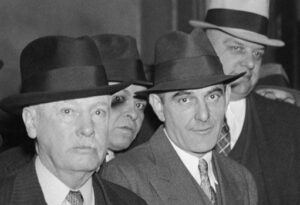 preparing the scam, which included hiring a forger to produce fake government stationery for him.
preparing the scam, which included hiring a forger to produce fake government stationery for him.
The scam was carried out on a small group of scrap metal dealers, who were invited to a confidential meeting at an expensive hotel. Lustig identified himself to them as the Deputy Director-General of the Ministère de Postes et Télégraphes (Ministry of Posts and Telegraphs). During the meeting, Lustig convinced the men that the upkeep of the Eiffel Tower was becoming too much for Paris and that the French government wished to sell it for scrap, but that because such a deal would be controversial and likely spark public outcry, nothing could be disclosed until all the details were thought out. Lustig Told the men that he had been charged with the task of selecting the dealer who would receive ownership of the structure. The men were told that they had “made the final cut” of possible contract winners, because of their reputations as “honest businessmen” and that he was going to make a final selection after the meeting. His speech included genuine insight about the monument’s place in the city and how it did not fit in with the city’s other great monuments like the Gothic cathedrals or the Arc de Triomphe. The men were convinced that Lustig was legitimate.
Because of his long history of reading people, Lustig knew how a perfect mark would look and act, and before long, he had his choice…André Poisson, who was an insecure man who wished to rise up amongst the inner circles of the Parisian business community. As Poisson showed the keenest interest in purchasing the monument, Lustig decided to focus on him once the dealers sent their bids to him. He then arranged a private meeting with Poisson, at which Lustig convinced him that he was a corrupt official, claiming that his government position did not give him a generous salary for the lifestyle he wished to enjoy. Poisson became concerned that he would not win the bid, so he agreed to pay a large bribe to secure ownership of the Eiffel Tower. His lust for the position of “top businessman” would be his downfall. Once Lustig received his bribe and the funds for the monument’s “sale” (around 70,000 francs, which is about $78,757), he soon fled to Austria. Lustig correctly suspected that when Poisson found out he had been conned, he would be too ashamed and embarrassed to inform the French police of what he had been caught up in. Still, he bided his time, checking the newspapers just to be sure. When his suspicions proved correct…when he could find no reference of his con within their pages, he returned to Paris later that year to pull off the same scheme one more time. The second attempt didn’t go over so well. Someone informed the police about the scam and Lustig had no choice but to flee to United States to evade arrest. Lustig is widely regarded as one of the most notorious con artists of his time, and he is infamous for being “the man who sold the Eiffel Tower twice.”

Lustig was finally arrested on May 10, 1935, in New York. He was charged with counterfeiting. He managed to escape from the Federal House of Detention in New York City by faking illness and using a specially made rope to climb out of the building on the day before his trial, but he was recaptured 27 days later in Pittsburgh. Lustig pleaded guilty at his trial and was sentenced to fifteen years in prison on Alcatraz Island, California for his original charge, with a further five years for his prison escape. On March 9, 1947, Lustig contracted pneumonia and died two days later at the Medical Center for Federal Prisoners in Springfield, Missouri. On his death certificate his occupation was listed as apprentice salesman…and I guess he was at that.
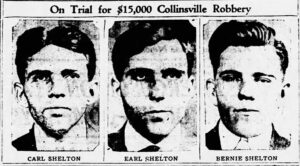 During the Prohibition-era there were many people who opposed the new laws prohibiting the sale and manufacturing of alcohol, in any form. As with any such restriction, there were plenty of people who were willing to take matters into their own hands and make, in this case, illegal liquor. It was a profitable business, and there were a number of people and gangs who wanted in. The Shelton Brothers Gang had a good thing going, when the famous bootlegger, Charles Birger and his gang wanted in.
During the Prohibition-era there were many people who opposed the new laws prohibiting the sale and manufacturing of alcohol, in any form. As with any such restriction, there were plenty of people who were willing to take matters into their own hands and make, in this case, illegal liquor. It was a profitable business, and there were a number of people and gangs who wanted in. The Shelton Brothers Gang had a good thing going, when the famous bootlegger, Charles Birger and his gang wanted in.
The Shelton Brothers Gang had other ideas, however. Both gangs were based out of southern Illinois. The best way to control the market price, is to be the only game in town. With all the fighting for supremacy, the Shelton Brothers Gang would allegedly be known as “America’s Bloodiest Gang” when the fighting quickly became a “Turf War.” The Shelton Brothers Gang was formed by Carl (born 1888), Earl (born 1890), and Bernie “Red” Shelton (born 1898) of “Geff” Jeffersonville, Wayne County, Illinois. They started their gang shortly after Prohibition came into effect in 1920, operating mostly in Williamson County, Illinois, making moonshine and other illegal alcoholic beverages. The operation grew, and they eventually dominated both gambling and liquor distribution in Little Egypt until 1926. That’s when a former ally now turned nemesis, gangster Charles Birger, attempted to take over 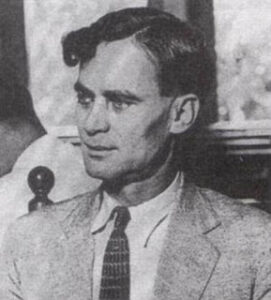 the Sheltons’ bootlegging operations. The result was a violent gang war. The weapons were varied. Both sides use homemade armored trucks and included an eventually included an aerial bombing raid by the Sheltons on Birger’s Shady Rest headquarters. They were out of control, and with the “stepped-up attacks” came what was considered the first bombing from a plane on US soil. Strangely, the “Turf War” was also responsible for keeping the KKK out of their general area after the constant flare ups into fights. The battle was for the control of bootlegging in all of southern Illinois and nothing more.
the Sheltons’ bootlegging operations. The result was a violent gang war. The weapons were varied. Both sides use homemade armored trucks and included an eventually included an aerial bombing raid by the Sheltons on Birger’s Shady Rest headquarters. They were out of control, and with the “stepped-up attacks” came what was considered the first bombing from a plane on US soil. Strangely, the “Turf War” was also responsible for keeping the KKK out of their general area after the constant flare ups into fights. The battle was for the control of bootlegging in all of southern Illinois and nothing more.
The whole thing was brutal in every way, and finally, the Shelton Brothers were set up and blamed for a murder they did not commit. Based on the testimony of Birger and Art Newman, the Shelton Brothers were convicted of an unsolved 1925 mail carrier robbery of $15,000 and sentenced to 25 years in prison, but they were later released. In the meantime, without its leaders, the Shelton Brothers Gang slowly faded, and just as he had planned, Birger dominated bootlegging in Southern Illinois, until he was hanged in 1928 after being convicted of ordering the murder of West City, Illinois, Mayor Joe Adams, who was a Shelton supporter. Eventually, the Shelton Brothers Gang was released for lack of evidence against them. The decided to move the operation to Peoria, Illinois, and focus mainly on gambling. They built an alliance with known gangsters like Al Capone and 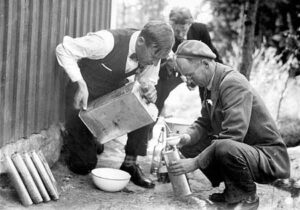 dominated their territory with very few serious rivalries. They did, however, come to the attention of the Federal Officials who eventually placed a $15,000 bounty on each of the Sheltons heads. Carl and Bernie Shelton were both murdered in 1948, on orders from former gang member Frank “Buster” Wortman, who had taken over the Shelton operations while they were in prison. Worman dominated Saint Louis’ illegal gambling and other criminal activities until his death in 1968. Earl Shelton was also ambushed and shot, but he survived. The hits just kept coming, and after a third attempt on his life in the early 1950s, Earl and his family left Illinois for Florida. Earl lived a quiet life there, and in 1986 at age 96, he passed away. He was the last member of the Shelton Brothers Gang.
dominated their territory with very few serious rivalries. They did, however, come to the attention of the Federal Officials who eventually placed a $15,000 bounty on each of the Sheltons heads. Carl and Bernie Shelton were both murdered in 1948, on orders from former gang member Frank “Buster” Wortman, who had taken over the Shelton operations while they were in prison. Worman dominated Saint Louis’ illegal gambling and other criminal activities until his death in 1968. Earl Shelton was also ambushed and shot, but he survived. The hits just kept coming, and after a third attempt on his life in the early 1950s, Earl and his family left Illinois for Florida. Earl lived a quiet life there, and in 1986 at age 96, he passed away. He was the last member of the Shelton Brothers Gang.

 My grandson, Caalab Royce has been making a few changes in himself lately. Most people have a tendency to let life get in the way of taking care of ourselves sometimes. It’s easy to do. Caalab has decided to get back in shape, so he’s been working out and getting buff. His sister, Shai Royce says he looks like he’s 19 again. I’m not sure if he would call that a compliment or not. Guys his age don’t want to look younger, hahaha!! Being an exercise enthusiast myself, I think he looks great. Caalab has always been a bit like me when it comes to our love of the outdoors and long walks. When he moved to Washington state with his family, though, he got to where he could outwalk me by quite a way. I was amazed at how far he walked. We both love being able to get out in nature and walk, while enjoying the beautiful scenes around us. Of course, these days, I think I have more time for it than Caalab does. Retirement does that.
My grandson, Caalab Royce has been making a few changes in himself lately. Most people have a tendency to let life get in the way of taking care of ourselves sometimes. It’s easy to do. Caalab has decided to get back in shape, so he’s been working out and getting buff. His sister, Shai Royce says he looks like he’s 19 again. I’m not sure if he would call that a compliment or not. Guys his age don’t want to look younger, hahaha!! Being an exercise enthusiast myself, I think he looks great. Caalab has always been a bit like me when it comes to our love of the outdoors and long walks. When he moved to Washington state with his family, though, he got to where he could outwalk me by quite a way. I was amazed at how far he walked. We both love being able to get out in nature and walk, while enjoying the beautiful scenes around us. Of course, these days, I think I have more time for it than Caalab does. Retirement does that.
Caalab and his dad, Travis Royce have long been playing guitar together. They don’t play professionally, and 
 you can call me biased, but I think they are really very good. These days, Caalab and Travis and a couple of friends get together every Wednesday for band practice. It is really fun to sit in the “audience” during practice sessions. It’s always nice to have that talent in your own family.
you can call me biased, but I think they are really very good. These days, Caalab and Travis and a couple of friends get together every Wednesday for band practice. It is really fun to sit in the “audience” during practice sessions. It’s always nice to have that talent in your own family.
With Caalab turning 25 years old, Amy and Travis are taking him to Vegas with their friends Burt and Amy and their kids. It’s going to be a great time. Caalab went to Vegas when he was 21, and they all enjoy going, so it will be fun to go again. They have been planning this for a while now, but Covid stopped it until now. They tend to do well on the slots, so I hope they will win and have a great time. Of course, there is lots to do in Vegas, besides gambling, so I know they will have plenty to do.
Caalab has always been such a happy kid. Always full of smiles, and mischief. He loves a good joke and never 
 forgets the punchline. He is a teaser from way back, something his sister had to learn to accept, and finally agree was funny. Caalab loved being the “funny man” and never missed a chance to make people laugh. He has grown to be a wonderful man, but sometimes I miss the little boy he was, and since he lives far away from me, I miss having him around too. Today is Caalab’s 25th birthday. Happy birthday Caalab!! Have a great day!! We love you!!
forgets the punchline. He is a teaser from way back, something his sister had to learn to accept, and finally agree was funny. Caalab loved being the “funny man” and never missed a chance to make people laugh. He has grown to be a wonderful man, but sometimes I miss the little boy he was, and since he lives far away from me, I miss having him around too. Today is Caalab’s 25th birthday. Happy birthday Caalab!! Have a great day!! We love you!!
 My husband’s uncle, Bobby Cole was a man who liked things to run on a slow, easy pace. That might be why he and his family moved the the dinky town of Kennebec, South Dakota. Bobby’s family was from that area, so it was an area he was comfortable with, and his family all agreed that it felt like home. Growing up in central South Dakota, Bobby liked the country lifestyle, and never really wanted to be anywhere else, even though they moved to Winnemucca, Nevada after a lightning fire destroyed their hotel, taking with it their income. That was a tough time for them. They had a life in Kennebec. They square danced, and socialized with friends. Nevertheless, they made the move to Winnemucca and settled into the area.
My husband’s uncle, Bobby Cole was a man who liked things to run on a slow, easy pace. That might be why he and his family moved the the dinky town of Kennebec, South Dakota. Bobby’s family was from that area, so it was an area he was comfortable with, and his family all agreed that it felt like home. Growing up in central South Dakota, Bobby liked the country lifestyle, and never really wanted to be anywhere else, even though they moved to Winnemucca, Nevada after a lightning fire destroyed their hotel, taking with it their income. That was a tough time for them. They had a life in Kennebec. They square danced, and socialized with friends. Nevertheless, they made the move to Winnemucca and settled into the area.

Both Bobby and Linda got jobs at the local casinos, and found that they enjoyed their lives there. Winnemucca was a very different place than Kennebec, but they liked the new social side of it. There was always new people to see and meet, and the gambling was fun for them. Like most people, they probably gambled more at first, but after a while, it becomes a normal part of life, and you end up doing it less. For most people, gambling…giving your money away to the casinos gets old, and you do it much less. Whenever we visited, they might play Keno a couple of times, but they would rather be at their house outside  of town, visiting with us than hanging out in the casinos.
of town, visiting with us than hanging out in the casinos.
Bobby and Linda were always fun people to be around, and we enjoyed the visits we made to their home both in Kennebec and Winnemucca. I’m so glad that we took the time to really get to know Bobby, Linda, and their kids, Sheila and Pat. We always felt like we had been a blessing to them, as they were to us. All too soon, Bobby left us, following a courageous battle with cancer on May 30, 2014, while seeking treatment in Colorado Springs, Colorado, Today would have been Bobby’s 78th birthday. Happy birthday in Heaven, Bobby. We love and miss you very much.
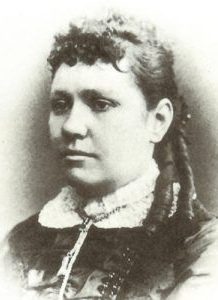 Alice Ivers Tubbs was born in Devonshire, England on February 17, 1851. She was the daughter of a conservative schoolmaster. While Alice was still a small girl, she moved with her family to the United States. The family first settled in Virginia, where Alice attended an elite boarding school for women. When she was a teenager, the family moved with the silver rush to Leadville, Colorado. As a young girl, Alice was raised to be a well-bred young lady, so few people would ever expect her to be known as “Poker Alice.” Nevertheless, marriage can change a person. While living in Leadville, Alice met a mining engineer named Frank Duffield, whom she married when she was just 20 years old. In the mining camps, gambling’s was quite common, and Frank was an enthusiastic player. He enjoyed visiting the gambling halls in Leadville and Alice naturally went along with him, rather than staying home alone. Alice stood quietly and watch her husband play…at first, but Alice was smart, and she picked up the game of poker easily. Soon she was sitting in on the games, and she was winning. Alice’s marriage to Frank Duffield was short-lived. Duffield, who worked in the mines as part of his job, was killed in an explosion. Needing to make a living, Alice, who was well educated, could have taught school, but even with 35,000 residents in Leadville, there was no school. There were also few jobs available for women, and those there were, did not appeal to Alice, so she decided to make a living gambling. Though Alice preferred the game of poker, she also learned to deal and play Faro. Very soon, she was in high demand…as a player and a dealer. Alice was a petite 5 foot 4 inch beauty, with blue eyes and thick brown hair. She was very rare in that she was a “lady” in a gambling hall…and not of the “soiled dove” variety. And Alice loved the latest fashions, she was a sight for the sore eyes of many a miner. Every time Alice had a big win, she began to take trips to New York City to buy the latest fashions.
Alice Ivers Tubbs was born in Devonshire, England on February 17, 1851. She was the daughter of a conservative schoolmaster. While Alice was still a small girl, she moved with her family to the United States. The family first settled in Virginia, where Alice attended an elite boarding school for women. When she was a teenager, the family moved with the silver rush to Leadville, Colorado. As a young girl, Alice was raised to be a well-bred young lady, so few people would ever expect her to be known as “Poker Alice.” Nevertheless, marriage can change a person. While living in Leadville, Alice met a mining engineer named Frank Duffield, whom she married when she was just 20 years old. In the mining camps, gambling’s was quite common, and Frank was an enthusiastic player. He enjoyed visiting the gambling halls in Leadville and Alice naturally went along with him, rather than staying home alone. Alice stood quietly and watch her husband play…at first, but Alice was smart, and she picked up the game of poker easily. Soon she was sitting in on the games, and she was winning. Alice’s marriage to Frank Duffield was short-lived. Duffield, who worked in the mines as part of his job, was killed in an explosion. Needing to make a living, Alice, who was well educated, could have taught school, but even with 35,000 residents in Leadville, there was no school. There were also few jobs available for women, and those there were, did not appeal to Alice, so she decided to make a living gambling. Though Alice preferred the game of poker, she also learned to deal and play Faro. Very soon, she was in high demand…as a player and a dealer. Alice was a petite 5 foot 4 inch beauty, with blue eyes and thick brown hair. She was very rare in that she was a “lady” in a gambling hall…and not of the “soiled dove” variety. And Alice loved the latest fashions, she was a sight for the sore eyes of many a miner. Every time Alice had a big win, she began to take trips to New York City to buy the latest fashions.
Due to her traveling from one mining camp to another to play poker, Alice soon acquired the nickname “Poker Alice.” In addition to playing the game, she often worked as a dealer, in cities all over Colorado including Alamosa, Central City, Georgetown, and Trinidad. Later on, Alice began to puff on large black cigars, still wearing her fashionable frilly dresses. She, nevertheless, never gambled on Sundays because of her religious beliefs. Alice carried a .38 revolver and wasn’t afraid to use it. It was rather a necessity, due to her lifestyle. Alice soon left Colorado and made her way to Silver City, New Mexico, where she broke the bank at the Gold Dust Gambling House, winning some $6,000. The win was followed by a trip to New York City, to replenish her wardrobe of fashionable clothing. Afterward, she returned to Creede, Colorado. She went to work as a dealer in Bob Ford’s saloon…the man who had earlier killed Jesse James. Alice later moved to Deadwood, South Dakota around 1890. In Deadwood, she met a man named Warren G. Tubbs, who worked as a housepainter in Sturgis, but sidelined as a dealer and 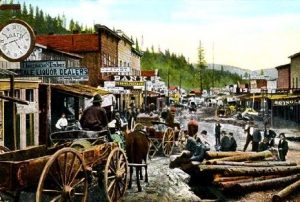 gambler. Alice usually beat Tubbs at poker, but that didn’t bother him. He was taken with her and they began to see each other socially. Once a drunken miner threatened Tubbs with a knife, Alice pulled out her .38 and put a bullet into the miner’s arm. I’m sure that man thought the threat was Tubbs, but the man should have watched Alice in stead. Later, the couple married and had seven children…four sons and three daughters. Because Tubbs was a painter by trade, he, along with Alice’s gambling profits, supported the family. The family moved out of Deadwood, to homesteaded a ranch near Sturgis on the Moreau River. Finally, Alice found something she loved more than gambling…for the most part. She helped with the ranch and raised her children. Then, fate would again deal Alice a bad hand. Tubbs was diagnosed with tuberculosis. Alice refused to leave his side. She planned to nurse him back to health. Tubbs lost his fight, and died of pneumonia in the winter of 1910. Alice was determined to give him a proper burial, so she loaded him into a horse-drawn wagon to take his body to Sturgis. It is thought that she had to pawn her wedding ring to pay for the funeral and afterward, went to a gambling parlor to earn the money to get her ring back.
gambler. Alice usually beat Tubbs at poker, but that didn’t bother him. He was taken with her and they began to see each other socially. Once a drunken miner threatened Tubbs with a knife, Alice pulled out her .38 and put a bullet into the miner’s arm. I’m sure that man thought the threat was Tubbs, but the man should have watched Alice in stead. Later, the couple married and had seven children…four sons and three daughters. Because Tubbs was a painter by trade, he, along with Alice’s gambling profits, supported the family. The family moved out of Deadwood, to homesteaded a ranch near Sturgis on the Moreau River. Finally, Alice found something she loved more than gambling…for the most part. She helped with the ranch and raised her children. Then, fate would again deal Alice a bad hand. Tubbs was diagnosed with tuberculosis. Alice refused to leave his side. She planned to nurse him back to health. Tubbs lost his fight, and died of pneumonia in the winter of 1910. Alice was determined to give him a proper burial, so she loaded him into a horse-drawn wagon to take his body to Sturgis. It is thought that she had to pawn her wedding ring to pay for the funeral and afterward, went to a gambling parlor to earn the money to get her ring back.
For Alice, the time spent on the ranch were some of the happiest days of her life and that during those years, she didn’t miss the saloons and gambling halls. Alice liked the peace and quiet of the ranch. Still, she had to make a living, so after Tubbs’ death, she hired a man named George Huckert to take care of the homestead, and she moved to Sturgis to earn her way. Huckert quickly fell in love with Alice and proposed marriage to her several times. Alice didn’t really love him, but finally married him, saying flippantly, “I owed him so much in back wages; I figured it would be cheaper to marry him than pay him off. So I did.” Once again, the marriage would be short. Alice was widowed once again when Huckert died in 1913.
During the Prohibition years, Alice opened a saloon called “Poker’s Palace” between Sturgis and Fort Meade that provided not only gambling and liquor, but also “women” who serviced the customers. One night, a drunken soldier began a fight in the saloon. He was destroying the furniture, and causing a ruckus. Alice pulled her .38 and shot the man. While in jail awaiting trial, she calmly smoked cigars and read the Bible. She was acquitted on grounds of self-defense, but her saloon had been shut down. Now, in her 70s and with her beauty and fashionable gowns long gone, Alice struggled in her last years. She continued to gamble, but these days, she dressed in men’s clothing. Once in a while, she was featured at 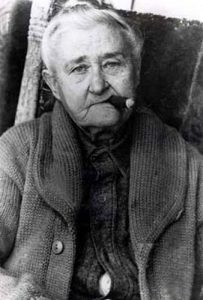 events like the Diamond Jubilee, in Omaha, Nebraska, as a true frontier character, where she was known to have said, “At my age, I suppose I should be knitting. But I would rather play poker with five or six ‘experts’ than eat.” She continued to run a “house” of ill-repute in Sturgis during her later years and was often arrested for drunkenness and keeping a disorderly house. Though she paid her fines, she continued to operate the business until she was finally arrested for repeated convictions of running a brothel and sentenced to prison. The governor took pity on Alice, who was then 75 years old, and pardoned her. At the age of 79, Alice underwent a gall bladder operation in Rapid City. Unfortunately, she died of complications on February 27, 1930. She was buried at Saint Aloysius Cemetery in Sturgis, South Dakota. In her lifetime, Alice claimed to have “won more than $250,000 at the gaming tables and never once cheated.” In fact, one of her favorite sayings was, “Praise the Lord and place your bets. I’ll take your money with no regrets.”
events like the Diamond Jubilee, in Omaha, Nebraska, as a true frontier character, where she was known to have said, “At my age, I suppose I should be knitting. But I would rather play poker with five or six ‘experts’ than eat.” She continued to run a “house” of ill-repute in Sturgis during her later years and was often arrested for drunkenness and keeping a disorderly house. Though she paid her fines, she continued to operate the business until she was finally arrested for repeated convictions of running a brothel and sentenced to prison. The governor took pity on Alice, who was then 75 years old, and pardoned her. At the age of 79, Alice underwent a gall bladder operation in Rapid City. Unfortunately, she died of complications on February 27, 1930. She was buried at Saint Aloysius Cemetery in Sturgis, South Dakota. In her lifetime, Alice claimed to have “won more than $250,000 at the gaming tables and never once cheated.” In fact, one of her favorite sayings was, “Praise the Lord and place your bets. I’ll take your money with no regrets.”
 My mother-in-law, Joann Schulenberg was the eldest of her parents three living children. Her older brother Everett passed away at birth. The second living child was Linda Cole, who was born 15 years after her older sister. Following Linda, youngest sister, Margaret was born three years later. It was almost like having two separate families, because Joann was practically grown up by the time her younger siblings arrived. In reality, Linda and Margee grew up with nieces and nephews, some of whom were closer in age to them than their own sister was, and there sister was almost like a second mother to them.
My mother-in-law, Joann Schulenberg was the eldest of her parents three living children. Her older brother Everett passed away at birth. The second living child was Linda Cole, who was born 15 years after her older sister. Following Linda, youngest sister, Margaret was born three years later. It was almost like having two separate families, because Joann was practically grown up by the time her younger siblings arrived. In reality, Linda and Margee grew up with nieces and nephews, some of whom were closer in age to them than their own sister was, and there sister was almost like a second mother to them.
Linda grew up and married Bobby Cole on December 29, 1965. Their marriage was blessed with a daughter, Sheila and a son, Patrick, both of whom are married and have children of their own now. Linda and Bobby ran a hotel in Kennebec, South Dakota for most of the years while their children were growing up. They loved the small town of Kennebec, and the social scene in the area. For a number of years, they were a part of a square dance club. I remember all their great dance clothes, and how much they loved being part of that club. I think it was the most fun they had in a long time.
 Unfortunately, the economy in Kennebec wasn’t doing too well, and after they lost their hotel to a fire, they decided that it was time for a change. The decided to move to Winnemucca, Nevada. they thought that the gambling might be just the ticket for them. The both found work in the casinos there, and dabbled in gambling on their time off. They really enjoyed their lives in Winnemucca. They were in a warmer climate, and far away from the harsh South Dakota winters. They would live out the remainder of their lives in Winnemucca. Bobby passed away on May 30, 2014, of cancer. After his passing, Linda seemed content to stay in Winnemucca, until her passing on September 22, 2016 of a heart attack. We miss them both very much. Today would have been Linda’s 71st birthday. Happy birthday in heaven Linda. We love you.
Unfortunately, the economy in Kennebec wasn’t doing too well, and after they lost their hotel to a fire, they decided that it was time for a change. The decided to move to Winnemucca, Nevada. they thought that the gambling might be just the ticket for them. The both found work in the casinos there, and dabbled in gambling on their time off. They really enjoyed their lives in Winnemucca. They were in a warmer climate, and far away from the harsh South Dakota winters. They would live out the remainder of their lives in Winnemucca. Bobby passed away on May 30, 2014, of cancer. After his passing, Linda seemed content to stay in Winnemucca, until her passing on September 22, 2016 of a heart attack. We miss them both very much. Today would have been Linda’s 71st birthday. Happy birthday in heaven Linda. We love you.

 My grandson, Caalab Royce is an adventurous kind of guy. He is willing to try just about any new thing…provided it’s legal and not too dangerous, of course. Caalab likes most types of games, but these days, he is into Midnight Laser Tag. He has done paintball as well, but compared to paintball, laser tag doesn’t hurt because it uses no physical projectiles. If I were going to play that game, I think I would like laser tag much better. Laser Tag is one of those games that don’t require a special facility, but rather just the right equipment. Caalab and his friends play the game outside…usually at midnight, because that’s when they get off work. He has always been a night owl, so it’s the perfect time of day for him…just don’t try to wake him up very early the next morning.
My grandson, Caalab Royce is an adventurous kind of guy. He is willing to try just about any new thing…provided it’s legal and not too dangerous, of course. Caalab likes most types of games, but these days, he is into Midnight Laser Tag. He has done paintball as well, but compared to paintball, laser tag doesn’t hurt because it uses no physical projectiles. If I were going to play that game, I think I would like laser tag much better. Laser Tag is one of those games that don’t require a special facility, but rather just the right equipment. Caalab and his friends play the game outside…usually at midnight, because that’s when they get off work. He has always been a night owl, so it’s the perfect time of day for him…just don’t try to wake him up very early the next morning.
Caalab has always been good at games, and at most sports. He has played softball off and on through the years, but this year, he is actually his team’s coach…and a player. Caalab has an unusual “style”in baseball, for lack of a better word. Caalab is right handed, but he bats left handed. He wasn’t really a good hitter, until his mom, my daughter, Amy Royce realized that he was awkward when he batted right handed. The improvement was instantaneous when he switched. I’m sure that he will be a great coach, although at the age these players are, I doubt he fill find anyone who would benefit from a batting hand change. That happens more when you are a kid. Nevertheless, I now that Caalab will have some great tips for his team members.
Caalab took up bowling with his family a couple of years ago, and has done quite well. Like softball, Caalab’s bowling is unusual, bit just like his dad, Travis Royce’s bowling. They don’t use the finger holes, but rather palm the ball. The result is a pretty serious curve. The thing about this type of curve is that most people can’t control it very well, but Caalab and Travis have both figured it out. This was Caalab’s second year of bowling, and he is doing very well. Early in the season…October 10th, to be exact, Caalab got his first 200 game. It was a 203. And he didn’t stop there, he got several more throughout the season. He is turning into quite the bowler. Maybe he takes after his grandparents, my husband, Bob and me. I know that he will have many more to come, because he is just pretty good at sports.

Today is Caalab’s 21st birthday. I can’t believe that he could already be 21 years old. I know that his parents are planning to take him out to the local casino to do a little gambling, and of course, for that traditional first legal drink. It is going to be a great time for sure, and I hope he really enjoys himself, and of course, “Win BIG, Caalab!! I hope you hit the jackpot. I’m glad you aren’t driving home, however!!” Happy birthday Caalab!! Have a great day!! We love you!!
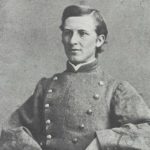
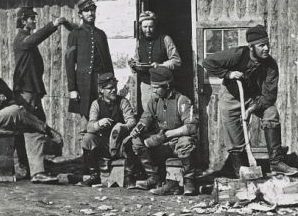 During the Civil War, the fighting was much different than these days…not just in the weapons used, but in a much bigger way. To send men out to battle in the winter was just too risky. Impassable, muddy roads and severe weather impeded active service in the wintertime. In fact, during the Civil War, the soldiers only spent a few days each year in actual combat. The rest of the time was spent getting from one battle to another, and wintering someplace because of bad weather. Even the rainy seasons caused problems, because rain brings muddy roads, and you can’t move heavy cannons on muddy roads. They get stuck. The soldiers tended to have a lot of time on their hands in the winter, and they couldn’t just go home either. In reality, disease caused more soldiers’ deaths than battle did.
During the Civil War, the fighting was much different than these days…not just in the weapons used, but in a much bigger way. To send men out to battle in the winter was just too risky. Impassable, muddy roads and severe weather impeded active service in the wintertime. In fact, during the Civil War, the soldiers only spent a few days each year in actual combat. The rest of the time was spent getting from one battle to another, and wintering someplace because of bad weather. Even the rainy seasons caused problems, because rain brings muddy roads, and you can’t move heavy cannons on muddy roads. They get stuck. The soldiers tended to have a lot of time on their hands in the winter, and they couldn’t just go home either. In reality, disease caused more soldiers’ deaths than battle did.
The soldiers sometimes kept journals of their time, which is where so much of the information we have about their time, came from. One such soldier was Elisha Hunt Rhodes. The winter months were monotonous for the soldiers. There was really nothing to do, but they needed to be kept in shape and at the ready, so the solution became days spent drilling. I’m sure that the boredom caused tempers to flair at times too, but the down time allowed the soldiers some time to bond and have a little bit of fun, as well. Nevertheless, the main objective for the winter months was to stay warm and busy, because their survival depended on it.
Rhodes was in the Army for four years, and he kept a journal for all of that time. He was a member of the 2nd Rhode Island Rhodes and fought in every battle from the First Bull Run to Appomattox. He rose from the rank of private to the rank of colonel in four years. According to Rhodes, the winter months were pretty quiet for the soldiers. They didn’t fight many battles, and so the months were spent drilling or smoking and sleeping. Some of the troops gambled and others drank or even visited the prostitutes who hung out around the camps. Believe it or not, the soldiers actually welcomed Picket Duty, which is when soldiers are posted on guard ahead of a main force. Pickets included about 40 or 50 men each. Several pickets would form a rough line in front of the main army’s camp. In case of enemy attack, the pickets usually would have time to warn the rest of the force. Picket Duty became a welcome break from the day to day monotony, because in Rhoades words, “One day is much like another at headquarters.”
Rhodes spent most of his winter months in or near Washington DC, giving him more diversions than some soldiers in the Civil War, who were in more remote locations. On one such trip into town came on February 26, 1862, he took the opportunity to hear Senator Henry Wilson from Massachusetts speak on expelling disloyal members of Congress. After listening to the speech, Rhodes and his friend Isaac Cooper attended a fair at a 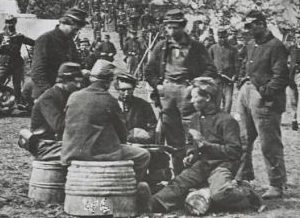
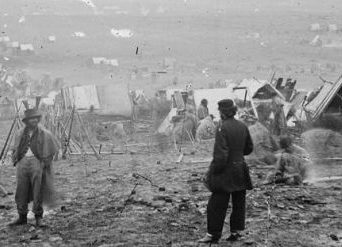 Methodist church and met two young women, who the soldiers escorted home. Like other soldiers, Rhodes welcomed the departure from winter quarters and an end to the monotony. “Our turn has come,” he wrote when his unit began moving south to Richmond, Virginia,in 1864. His winter break was over, and he would find himself back in battle again. Rhodes would survive the Civil War and after a long life, passed away on January 14, 1917 at 75.
Methodist church and met two young women, who the soldiers escorted home. Like other soldiers, Rhodes welcomed the departure from winter quarters and an end to the monotony. “Our turn has come,” he wrote when his unit began moving south to Richmond, Virginia,in 1864. His winter break was over, and he would find himself back in battle again. Rhodes would survive the Civil War and after a long life, passed away on January 14, 1917 at 75.

